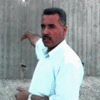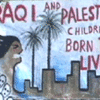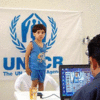
The mayor of Qalqilya explains the impact of Israel's apartheid wall
10 July 2003
On July 10, EI’s Arjan El Fassed visited Israel’s apartheid wall built on confiscated Palestinian land in Qalqilya. The mayor of Qalqilya, Marouf Zahran explains the impact of Israel’s apartheid on his town. The wall surrounds the town almost completely. The 8 meter high wall will be surrounded first by a trench of four meters wide and two meters deep, barbed wire and a military zone patrolled by Israeli occupying forces. Palestinian property within 35 meters of the wall has been or will be destroyed by the Israeli army. [3.45 mins, Quicktime file, 6.9MB] Read more about The mayor of Qalqilya explains the impact of Israel's apartheid wall





